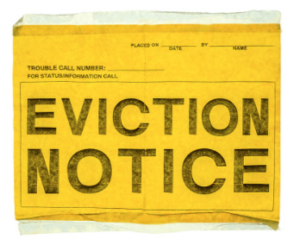
Landlords who evict tenants of residential property could face jail time or a fine up to $500,000. Under an Order issued on September 1, 2020, an eviction moratoria will go into effect on September 4, 2020.
The purpose of the Order entered by the Centers for Disease Control and Prevention is to stop the spread of COVID-19. A hold on all evictions “facilitate[s] self-isolation by people who become ill or who are at risk for severe illness from COVID-19 due to an underlying medical condition.”
The order applies to “residential property.” Residential property is any property that is “leased for residential purposes, including any house, building, mobile home or land in a mobile home park, or similar dwelling.” It does not include hotels, motels, or other guest houses rented to “a temporary guest or seasonal tenant” (e.g., a house rented on Airbnb). The order covers all 50 states. The hold on evictions will end on December 31, 2020.
During the ban on evictions, the tenants still have to pay rent and comply with the terms of the lease. The tenant may be evicted for a breach of a lease other than the failure to pay rent. For example, if the tenant is engaged in illegal activity, threatening other residents, damaging property, or violating any “applicable building code, health ordinance, or similar regulation relating to health and safety”, the eviction may go forward.
In order to be protected from eviction, the tenant must sign a declaration and give it to the landlord. In the declaration, the tenant must state under oath that:
1. The tenant has “used best efforts to obtain all available government assistance for rent or house.”
2. The tenant expects (a) to earn no more than $99,000 in annual income in 2020 or no more than $198,000 if the tenant files a joint tax return; (b) not report any income in 2019 to the IRS; or (c) received an Economic Impact Payment (i.e., a stimulus check).
3. The tenant is “unable to pay the full rent…due to substantial loss of household income, loss of compensable hours of work or wages, a lay-off, or extraordinary out-of-pocket medical expenses.” An “extraordinary out-of-pocket medical expense” is any unreimbursed medical expense likely to exceed 7.5% of adjusted gross income for 2020.
4. The tenant is making “best efforts to make timely partial payments” of rent. The partial payment must be as “close to the full payment as the individual’s circumstances may permit, taking into account other nondiscretionary expenses.”
5. An eviction will either end up in the tenant being homeless or “force[d]…to move into and live in close quarters” with other people.
If a tenant provides a false declaration, there are criminal and civil penalties. A separate declaration should be completed and signed by each adult listed on the lease.
The order was issued under 42 C.F.R. § 70.2. This code section states:
Whenever the Director of the Centers for Disease Control and Prevention determines that the measures taken by health authorities of any State or possession (including political subdivisions thereof) are insufficient to prevent the spread of any of the communicable diseases from such State or possession to any other State or possession, he/she may take such measures to prevent such spread of the diseases as he/she deems reasonably necessary, including inspection, fumigation, disinfection, sanitation, pest extermination, and destruction of animals or articles believed to be sources of infection.
This federal regulation allows the CDC to “take such measures”, including “inspection, fumigation, disinfection, sanitation, pest extermination, and destruction of animals or articles believed to be sources of infection.” Each of these measures deal with actions to stop the spread of disease. A moratoria on evictions may exceed the authority granted the CDC under 42 C.F.R. § 70.2.
There are also a host of other questions that will likely be answered in future litigation, including:
1. If a tenant fails to follow local, state or federal health guidelines (i.e., a mask mandate), can the tenant be evicted?
2. How does a landlord challenge the assertion that the tenant “used best efforts to obtain all available government assistance?”
3. How does a landlord challenge the assertion that the tenant earns less than $99,000 (of $198,000 if the tenant files a joint return)?
4. How does a landlord challenge the assertion that the tenant is unable to pay rent “due to substantial loss of household income, loss of compensable hours of work or wages, a lay-off, or extraordinary out-of-pocket medical expenses”?
5. How does a landlord challenge the assertion that the tenant “best efforts to make timely partial payments” of rent?
In conclusion, the CDC order stops residential evictions if the tenant provides the landlord a declaration that complies with the order. It does not apply to commercial tenants. If a landlord receives a declaration from a tenant, it should stop the eviction to avoid criminal penalties. Because the tenant must still pay rent, the landlord may “restart” the eviction after December 31, 2020. However, to avoid problems, landlords must proceed with caution from now until December 31.